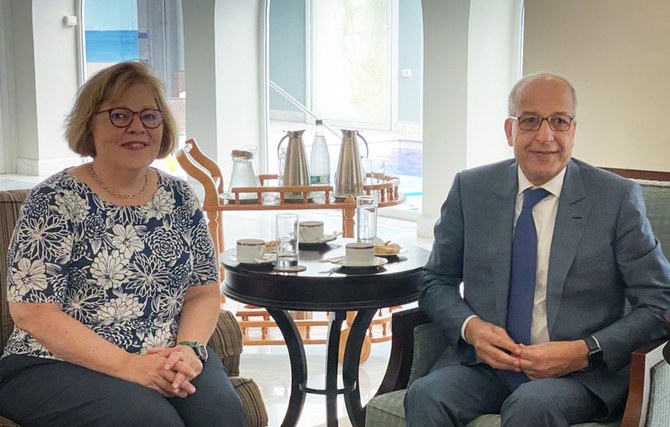LONDON: Libya’s full integration into the global economy is being hampered by actors pursuing destabilizing agendas that undermine peace and national unity, the US said on Wednesday.
The comments came after the US Assistant Secretary of State for Near Eastern Affairs Barbara Leaf held separate meetings with Mohammed Al-Menfi, the head of the Libyan Presidential Council, and Richard Norland, the US special envoy and ambassador to Libya.
“(There were) fruitful consultations with (Norland) and the US embassy in Libya team on the prospects for boosting the US diplomatic presence in Libya to promote stability, security cooperation, economic growth and sustainable development,” Leaf said during her visit to Tunisia.
“We eagerly hope that the US embassy can permanently return to Tripoli as soon as possible to provide consular, trade promotion, educational advising, and other services.”
The embassy closed and operations moved to neighboring Tunisia in 2014 because fighting near the capital posed too much of a danger.
“The outbreak of violence in Tripoli this past weekend demonstrates that political figures from both East and West must reconcile, commit to a constitutional basis for elections, and put the interests of the Libyan people ahead of their own,” Leaf said.
Heavy gunfire and shelling last week in several neighborhoods of Tripoli left 32 people dead.
Libya descended into chaos after a NATO-backed uprising in 2011 toppled and claimed the life of longtime dictator Muammar Qaddafi. Since then, the oil-rich county has been split between rival administrations.
“It is tragic that warring factions with their own agendas have been unable to meet the aspirations of millions of Libyans, including students, entrepreneurs, educators and community leaders, who desperately seek to choose the leadership of their country peacefully,” Leaf said.
During a phone call with Al-Menfi, Leaf discussed the recent violence in Tripoli and they agreed that peaceful dialogue to agree a constitutional basis for democratic elections is vital to prevent further instability and conflict.
The State Department said that Leaf noted that the most recent violence has disrupted US efforts to reestablish a diplomatic presence in Libya. She added: “The sooner the situation stabilizes, the sooner we will be able to resume embassy operations.”
Leaf also met Saddek Elkaber, governor of the Central Bank of Libya, in Tunis. During their discussions she underscored the US support for the bank’s “efforts to strengthen transparency in the financial sector to ensure equitable use of public funds for the benefit of all Libyans.”
Meanwhile, the State Department said on Wednesday that Leaf is on an official trip to Tunisia, Israel, the West Bank and Jordan that began on Monday and will continue until Sunday.
In Tunis, in addition to her meetings with Norland and Elkaber, she was set to meet senior government officials and leading local experts, including economic analysts, to hear their views on a path forward to improve prosperity for all Tunisians.
“Her visit underscores US support for an inclusive and transparent political and economic reform process that represents diverse Tunisian voices and protects fundamental human rights, including freedom of expression,” the State Department said.
She will also reiterate the support of the US for a political resolution to the Libyan conflict in talks with senior Libyan and Tunisian officials, as “the recent outbreak of violence in Tripoli demonstrates the urgency for warring factions to reach consensus on a constitutional basis for elections to prevent further instability.”
Leaf will visit Israel and the West Bank from Sept. 1-3, where she will meet Israeli and Palestinian officials to discuss a range of priority issues, including Washington’s commitment to Israel’s security, the strengthening of US cooperation with Israel and the Palestinian Authority, America’s interest in improving the quality of life for the Palestinian people, and the Biden administration’s continued support for a two-state solution.
In Amman, she will meet Jordanian Foreign Minister Ayman Safadi to discuss the strategic relationship between their countries, joint efforts to promote regional stability, and the new seven-year, $10.15 billion bilateral memorandum of understanding on a strategic partnership that was announced by President Joe Biden following his meeting with King Abdullah II in July.


























